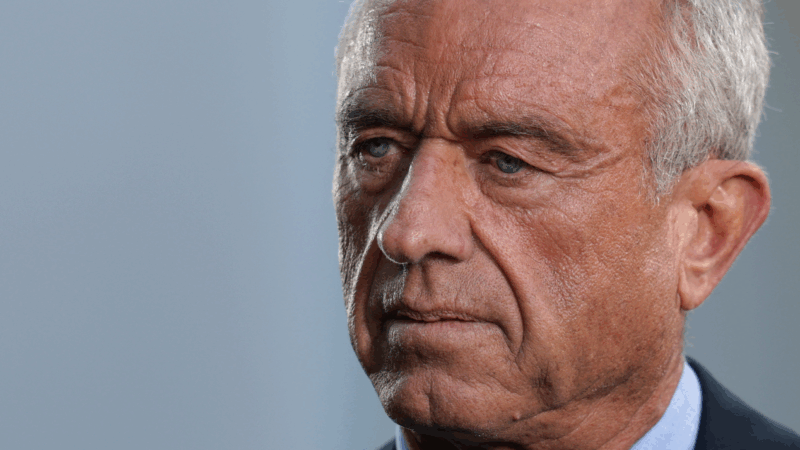A new Utah law is Republicans’ latest effort to limit mail ballot return
Utah Gov. Spencer Cox has signed a bill that makes sweeping changes to the state’s popular mail voting program, including removing a grace period for postmarked ballots that arrive after Election Day.
The new law is part of a larger effort by Republicans to limit the window in which mail ballots can be counted during an election.
Last October a U.S. appeals court sided with the GOP against a Mississippi law that allows mail ballots to be counted if they are postmarked by Election Day but arrive after it. And along with Utah, Republican lawmakers in Kansas on Tuesday limited mail ballot return windows. Other states, including West Virginia, are seeking to join them.
President Trump also signed an executive order Tuesday requiring that all states only count ballots that are received by Election Day. The order is expected to face legal challenges.
In Utah, as soon as the next election, voters casting mail-in ballots will need to make sure their ballot is received by election officials by 8 p.m. on Election Day. Previously, voters had up to two weeks to get their ballot counted if it was postmarked by the day before Election Day.
In a press conference earlier this year, Cox told reporters that these changes were needed so the state can count most of its ballots on election night and media outlets can call races sooner.
“There’s no reason we couldn’t do that,” Cox said. “That’s just a choice that we’ve made to allow a large amount of mail in ballots to come in after [Election Day] as long as they’re postmarked the day before the election, they can come in for a week or two afterwards.”
Several states this year are considering laws aimed at speeding up election results. Most proponents say faster results increase confidence in elections because they allow less time for misinformation to take hold. That’s even though there is no evidence of widespread fraud in American elections.
“I believe that that’s something that would add trust to the system,” Cox said. “I think one of the areas where we start to lose trust is when there isn’t a decision on election night and there’s lots of ballots out there and somebody may have been winning on election night and then five days later they’re losing a race. And that calls into question lots of things. Even though … we have complete integrity in our elections.”
Voting rights advocates, however, argue that many of these changes in pursuit of faster results sacrifice access to the ballot.
Barbara Smith Warner — executive director of the National Vote At Home Institute, which advocates for broader access to mail-in voting — said many states provide a grace period for voters to make sure their vote is counted, even if there are delays with the post office.
“In the 2024 election, there are about 2,000 voters [in Utah] whose ballots were indeed postmarked by Election Day and received within the three days,” Warner said. “Those folks and whoever else will no longer have that. So that’s kind of the first thing that’s going to make it harder right away for Utahns to vote.”
Utah is no longer a universal mail-voting state
The new law also makes broader changes to the state’s mail voting system.
Before the bill was signed, Utah was one of eight states, plus Washington, D.C., that automatically sent mail ballots to eligible voters. Utah was also the only fully Republican-led state to have such a program.
Voters will still be able to vote by mail, but starting in 2029 they will have to request a ballot. Voters will also be required to provide identifying information on their ballot, if they decide to mail it back or drop it off at a ballot box.
According to reporting from the Salt Lake Tribune, Utah’s vote-by-mail program was widely used in a state where many voters live hours away from a local election office or ballot box. The newspaper’s analysis of the 2024 primary election found that “96.7% of Utahns who cast a primary vote — over 400,000 people — either voted by mail or left their ballots in drop boxes.”
The bill’s proponents say it increases election security. Warner told NPR she expects there will be a dip in voter participation when the law fully goes into effect.
She said her group has found a significant increase in turnout as election officials began to automatically send out mail ballots in Utah several years ago. And, Warner said, she thinks many voters will be off-guard when they have to start requesting them again.
“I think people are going to be really unhappy,” Warner said. “What’s going to end up happening is Utah voters are going to pay the price and they are going to be the ones who are going to have a harder time voting and are going to be really unhappy with the way these policies end up impacting their ability to vote.”
Opinion: Remembering Ai, a remarkably intelligent chimpanzee
We remember Ai, a highly intelligent chimpanzee who lived at the Primate Research Institute of Kyoto University for most of her life, except the time she escaped and walked around campus.
The near death — and last-minute reprieve — of a trial for an HIV vaccine
A trial was about to launch for a vaccine that would ward off the HIV virus. It would be an incredible breakthrough. Then it looked as if it would be over before it started.
Bessemer data center developer to request rezoning for additional 900 acres
The city’s attorney informed council members of the request on Tuesday, warning that there may be media scrutiny.
Is RFK Jr.’s Administration for a Healthy America — AHA — in the works or not?
The Administration for a Healthy America is RFK Jr.'s plan to tackle chronic disease, addiction and other persistent problems. But so far it's not being set up like previous new agencies.
They quit their day jobs to bet on current events. A look inside the prediction market mania
Prediction market apps are thriving in Trump's second term, with traders betting on migrant deportations to election outcomes. A community of young, mostly male and very online traders are driving the industry's bonanza.
Major plumbing headache haunts $13 billion U.S. carrier off the coast of Venezuela
The crew of USS Ford is struggling to handle sewage problems on board the Navy's newest carrier.




